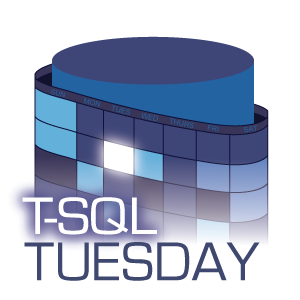
This post is a response to this month's T-SQL Tuesday prompt. T-SQL Tuesday was created by Adam Machanic and is a way for SQL users to share ideas about interesting topics. This month's topic is The Times They Are A-Changing.
I think everyone's had the same fear at some point in their career: "Am I going to lose my job because of X?" X can be a variety of things — company reorganizations, positions being outsourced, robotic automation, new software advancements, etc…
I think the answer to this question depends 100% on the type of individual you are and nothing to do with what your job actually is (was).
Being a Linchpin
Seth Godin discusses the concept of a Linchpin in his same-titled book. A Linchpin is someone who is so good at what they do that they become indispensable to their organization. Linchpins are the kind of people who are self-motivated and are able to consistently deliver quality work. They are integral to the operation of a business, even if they don't get all of the glamour of having VP or Director in their title.
And why are Linchpins always guaranteed jobs? In one scenario, Linchpins will outgrow their role and be promoted or find a better job. They are always learning and growing in addition to delivering, and so this is the natural procession. In the alternate scenario, if the Linchpin has to lose his or her current job (ie. think company buyouts where entire departments close), they will either 1) become promoted to elsewhere in the company because management recognizes their great skills or 2) they will have no problem finding work elsewhere, especially with great recommendations from their former employer.
The Cloud, SaaS, PaaS, and other technologies
The past few years have seen many new technologies come into the SQL professional's workspace. Administrators now have the ability to manage their server instances online in the cloud and use new features and functionality that weren't previously available in local-network only instances. Developers also have new tools to interact with cloud instance, but also have totally new functionality available to them from a variety of online services.
As of now, I think most of these new advancements augment our current technology instead of replace it. I think this means that some professionals will choose to not learn about them or how to use them. And it's really easy to justify not learning them — it can be hard for some to find the time to learn something that they can't immediately use.
However, some professionals will be excited and will learn about these new technologies. Even if their environments don't need to use cloud platforms and other new features, they will find small areas in their environment that can use these technologies so they start getting experience using them. Worst case, even if it's not possible to modify something existing with these new tools, these professionals will create sandboxes for themselves and learn to use some of these technologies anyway. By doing this, they will be more confident in using these tools when the time necessitates that they be used.
When it's time to be promoted or to switch jobs, which of the two professionals is more likely to get hired — the one who knows only his or her old technology really well, or the professional who has taken the time to learn these new features even if they didn't have to use them in their old environment?
Is my role of business intelligence developer going to disappear?
I'm a professional learner. Officially I'm a business intelligence developer, but unofficially I also am a web developer, manager, DBA, and electrical engineer. I don't pretend that I am an expert in all of those unofficial capacities (or even the official one!), but I do continually try to improve myself in all of those roles.
Do I worry about having new technologies replace my current job role? No. I do think the tools I use today will be outdated and replaced at some point in the future though.
I imagine some future version of SSRS will be able to generate the majority of the reporting needed for my database based off metadata. Data will continue to evolve and live in environments other than just SQL Server, making my need for SSIS less important — I'll have to learn other ways to transform data, whether through C#, Python, some cloud querying tool, or all of the above. I'll have to get used to not only using data from databases and flat files, but also mixing in data from APIs and cloud storage. Some of this data will be relational but a lot of it will not.
And all of that sounds exciting! Learning new ways of working with data is a thrill because it means I won't get bored working on the same thing year after year. Sure, 10 years from now new technologies will replace my current job — fortunately for me though, by that point I'll be working with those new technologies.
